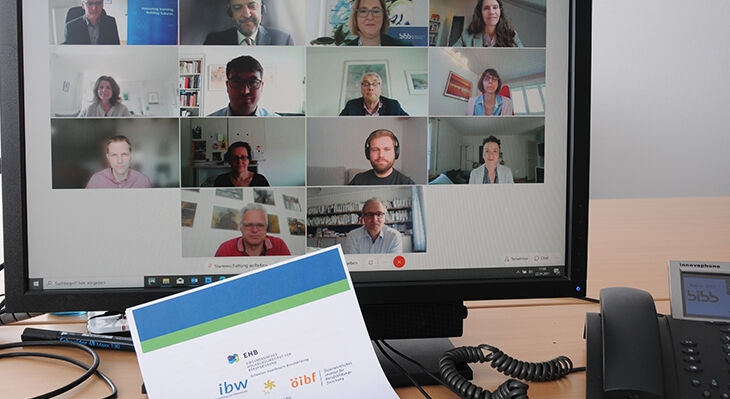Vocational education and training institutes in the German-speaking countries stage their first virtual contact seminar
Vocational education and training experts discuss the challenge of securing a supply of skilled workers and new approaches in VET research
27.04.2021
The topics debated at the 2021 Contact Seminar held together with BIBB’s partner institutes from Austria and Switzerland were the need to secure a supply of qualified skilled workers and new approaches being adopted in vocational education and training research. The event took place virtually for the very first time because of the coronavirus pandemic.

Representatives from the German-speaking vocational education and training institutes in Austria, Switzerland and Germany hold a regular specialist networking meeting every two years. The contact seminar planned for 2020 was postponed due to the coronavirus, and delegates have now convened virtually for the very first time.
The entire focus of this first virtual contact seminar was the requirement for skilled workers and ensuring the availability of a qualified workforce. This is a major education and training policy challenge in all three countries. The contact seminar provided the ideal platform to network on measures and initiatives both of a different and similar nature which have been undertaken with a view to securing a sufficient supply of skilled workers on the labour market.
The event took place on 22 and 23 April 2021 and featured 14 presentations on the topic. These were given by representatives from the Swiss Federal Institute for Vocational Education and Training (SFIVET), the Austrian Institute for Training Research in Trade and Industry (ibw), the Austrian Institute for Research on Vocational Training (öibf) and the consultancy and research company 3s Unternehmensberatung GmbH. BIBB arranged for the seminar to be held online due to the constraints imposed by the pandemic. The virtual format also meant that other interested academic researchers from the three countries were able to take part.
“We have been productively collaborating with our Swiss and Austrian partners y for many years,” stated BIBB’s President Professor Friedrich Hubert Esser during his welcoming address. “The contact seminars are a particularly well established and successful format for networking to take place between similarly structured VET systems. They constantly provide us with interesting starting points for our work. This time, the pandemic has forced us to exchange views via a purely online approach. But I am confident that the joint endeavours we are undertaking will strengthen our networking and cooperation still further.”
National networking – current developments in the VET systems and at the institutes

Representatives from the three countries opened the event by providing information on current topics and developments in their vocational education and training systems and by presenting the latest news from their institutes. In Switzerland, a new law means that the Swiss Federal Institute for Vocational Education and Training will become an equal partner in the higher education system from August 2021. Dr. Fontanellaz, Director of SFIVET, also explained that this move would be accompanied be a realignment of the institute’s strategic guidelines for the period 2021-2028. Professor Baumeler, Head of the Research and Development Division at SFIVET, followed up with a summary of current research and study projects.
The latest from the field of VET research
During a block of the programme dedicated to new theoretical approaches being adopted in vocational education and training research, representatives from BIBB were amongst those offering insights into the theoretical bases underlying their own work. Dr. Dietzen, Dr. Gerhards and Mr. Schlieker all addressed the issue of the influence being exerted by company competence management on the covering of company skills requirements. Dr. Mottweiler highlighted the impact that European VET policy is having on national systems and governance mechanisms in a keynote presentation entitled “Governance of vocational education and training systems”.
Dr. Humpl from the Austrian firm Unternehmensberatung 3s used his presentation on the “Future of VET” project to concentrate on the European dimension of vocational education and training. This ongoing CEDEFOP Project (2019 to 2022) is investigating the factors which influence opportunities and challenges in VET in Europe. BIBB’s “International VET Comparison, Research and Monitoring” Division, which forms part of the institute’s International Department, is involved in providing expertise for the project’s implementation.
Focus – the requirement for skilled workers and ensuring the availability of a qualified workforce

The challenges relating to securing the supply of skilled labour formed the focus of the second day of the seminar, and speakers highlighted various adjustments being applied to help counter the problem.
Mr. Mayr and Mr. Wallner from the ibw reported on the impacts being exerted on quality development and quality assurance as a result of the implementation of a National Qualifications Framework (NQF) in Austria. The ibw and the öibf are acting as NQF service agencies for providers of non-formal qualifications seeking alignment for their training provision. Because this has led to a growth in alignment requests for non-formal qualifications, the Austrian NQF has attained a greater degree of legalisation than its German counterpart thus far.
The attractiveness of dual vocational education and training for companies depends in particular on achieving a balanced cost-benefits ratio. Professor Pfeiffer (BIBB) and Professor Schweri from SFIVET presented the results that have emerged from cooperative research conducted by their respective institutes. This cooperative project involves carrying out a comparative analysis of the costs and benefits of training for companies in Germany and Switzerland. The outcome revealed an interesting difference. In Switzerland, companies are able to obtain a net benefit during the course of training itself. In Germany, by way of contrast, such a net benefit is only achieved in the medium term, after conclusion of training and once the former trainee has been employed permanently.
Professor Ertl (BIBB) underlined the importance of comparative research in this regard. He pointed out that dual VET in Austria, Switzerland and Germany display different types of duality. Differentiated argumentation is required, and this will then enable us to learn from one another.
Trainees particularly perceive vocational education and training to be attractive if it produces employment prospects for them. Mr. Löffler from the öibf presented the Austrian transitional system as an example in this regard.
The Swiss Vocational Baccalaureate qualification encourages educational aspiration and forms part of the debate surrounding academisation. Within this context, Professor Kriesi (SFIVET) presented the results of a longitudinal study which is just about to conclude. This has been investigating the further pathways of education and training embarked upon by pupils.
Mr. Dornmayr (ibw) provided insights into the first representative survey of company-based training staff in Austria. Some of the topics addressed were understanding of role, challenges faced, as well as desires and wishes. Mr. Bliem showcased the New Skills Initiative of the Austrian Labour Market Service (AMS).
The presentation given by Professor Baumeler and Dr. Engelage from SFIVET centred on the importance of institutional work by professional associations, especially if such activities focus on “small” occupations and on the maintenance of a collective occupational identity. They used the occupation of piano maker as an illustrative example.
“Regular specialist networking in the contact seminars has now become an established tradition and is highly important to the international work of BIBB,” stated Ms. Thomann, Head of BIBB’s International Department and the main instigator of the contact seminar. “There are many contacts between our institutes during the course of the year, but this ‘pit stop’ every two years always proves highly profitable in terms of coming together within an institutional framework and identifying new points of reference.”
Cooperation between the German-speaking VET institutes of Germany, Austria and Switzerland is a long-standing tradition. For more than a decade, representatives from SFIVET, the ibw, the öibf and BIBB have been meeting every two years to engage in specialist networking. Topics addressed include current main research focuses and developments in initial and continuing vocational education and training in Europe’s German-speaking countries.
The next contact seminar is scheduled to take place in Austria in 2023.